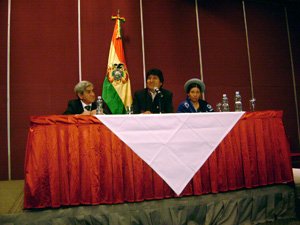The Event, Organized by the Mexico City Government, Was Evo's First Official Visit to Mexico
 Evo Morales visited Mexico City on Sunday evening on his way to a Rio Group summit in Cancun. The Mexico City government, controlled by the center-left Democratic Revolution Party (PRD), organized a public event and press conference to receive the Bolivian president.
Evo Morales visited Mexico City on Sunday evening on his way to a Rio Group summit in Cancun. The Mexico City government, controlled by the center-left Democratic Revolution Party (PRD), organized a public event and press conference to receive the Bolivian president.
Hundreds of Mexicans crowded into the central plaza in Coyoacan, an upscale neighborhood in southern Mexico City, to hear Morales speak. Many wove wiphala flags, the rainbow-colored flag that represents Andean indigenous peoples in Bolivia. Bolivia's new constitution, written during President Morales' administration, officially recognizes the wiphala as a government flag.
Union leaders and some rank-and-file union members were in attendance. Uniformed members of the Mexican Electrical Workers Union (SME) could be seen dispersed throughout the crowd. SME Secretary General Martin Esparza was also reportedly in attendance. Other unions, such as the PRD-aligned Public Transport Workers Union, hung their banners around the plaza in Coyoacan.
Grassroots and indigenous organizations for the most part did not have a visible presence in the crowd. However, Felisa Segundo Mondragon, a mazahua originally from Mexico State, spoke at the event. She originally arrived in Mexico City with her 9-year-old daughter in search of work. In the 1990s she helped found the Flor de Mazahua artisan cooperative, where she and other mazahua women produced traditional mazahua toys, dresses, and blouses for sale in Mexico City and abroad. She is now an indigenous representative in the United Nations. Segundo enthusiastically received Morales: "His struggle is our struggle... because he is the only man who is recognized throughout Latin America who listens to us, and because he has suffered with us."
 Trinidad Ramirez, wife of the imprisoned leader of the People's Front in Defense of the Land (FPDT), also appeared in stage to present Morales with a red bandana.
Trinidad Ramirez, wife of the imprisoned leader of the People's Front in Defense of the Land (FPDT), also appeared in stage to present Morales with a red bandana.
During the event some indigenous people held an Ancestral Ritual in which they ceremoniously presented a scepter to President Morales. During the ceremony, participants burned copal, an incense made of tree resin. In Mexican indigenous cultures, copal is used in ceremonies as a bridge or mediator between people, heaven and earth, and the living and the dead.
Bolivia's indigenous president recognized the contradiction that Sunday's visit presented: his first public visit to Mexico was organized by a political party, not indigenous organizations. His first order of business during the event in Coyoacan was to apologize to Mexican indigenous organizations who had sent him many invitations to meet with them. "I'm sorry that I couldn't come because I had the difficult work of defending myself as President," he said.
Morales said that his speech was directed at "the social movements...that dream of another world." He recounted his experiences in social movements and later in the electoral arena. "First, we identified internal enemies and purged them from the popular movement."
Morales identified a 1991 meeting of indigenous peoples in Quetzaltenango, Guatemala, as the moment leaders of the popular movement in Bolivia decided to organize themselves to take state power. "It took us four or five years [after that] to transform ourselves from a popular struggle to an electoral struggle, from resistance to taking political power." He went on to explain that in 1995, after forming concrete proposalsregarding the defense of Bolivia's natural resources and public services, the movement worked to unite peasant and indigenous movements. "Then we united ourselves with leftist political parties, communist parties, socialist parties--with everyone." Morales says that when the electoral campaigns began, "We made a call to the middle class, to the intellectuals, to join us as well." Uniting so many different factions, Morales argued, was key to winning 64% of the popular vote in December's elections.
Morales argued that workers and indigenous peoples throughout America can unite around the common issues of dignity, sovereignty, the recuperation of natural resources, and against the privatization of public services.
Later in the evening Morales offered a press conference in the Sevilla Palace hotel on Paseo de la Reforma. There, he stressed the importance of creating a new Organization of American States that does not include the United States. He said that he will present this proposal at the upcoming Rio Group summit in Cancun. Morales asked those gathered at the press conference, "How far can we get with empire or without empire? In my experience, it's better without empire."
Fernando Leon contributed to this report.
This report originally appeared in Narco News.







0 comments:
Post a Comment Anonymously or Using Your Google ID
or Comment Using Facebook, Yahoo!, Hotmail, or AOL: